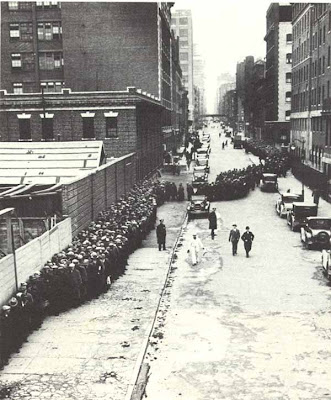 Breadlines, Christmas, 1931
Breadlines, Christmas, 1931
We need to name our depression, the one that started maybe a year ago and that will go on for a decade. The one that has evaporated almost all the savings and assets of the working people in the U.S., wiped out pensions and piggy banks, taken homes and cars and jobs and happiness and hope. That one. We need to call it the Bush-Cheney Depression.
We should use that phrase at every opportunity, even when it's inappropriate. If somebody asks on Thursday whether you would like some butter for your rolls, get it into the sentence somehow, such as by saying "Well now that we're in the Bush-Cheney Depression, I guess none of us will be eating butter for much longer."
The Republicans are already calling this the Obama Depression. Can you imagine such lies? Oh silly me, I already told you it was the Republicans saying it. It would be better to say can you imagine a Republican telling the truth? I can't.
I would like Bush and Cheney's names to live on in infamy long after they are gone, like Judas, and Brutus, and Benedict Arnold, people who are traitors, who sell out their own country, who turn their backs on their own people.
We still teach our kids about the Great Depression. So it's more than likely that generations from now, children will also be hearing about this one -- the Bush-Cheney Depression.
Of course back then, in the Great Depression (in contrast with the Bush-Cheney Depression), veterans got mis-treated just like they are today. A group of men who had been promised a bonus -- a fairly small amount of money -- if they signed up to fight in WWI, never got that money. So they got together, began agitating and organizing, and finally had a "march on Washington," set up tent cities, and said they refused to leave until they were paid. The U.S. government eventually chased those veterans out with police and violence. Some of them were dumped in Florida and died in a hurricane out in the middle of nowhere, homeless, exposed, abandoned by their government. Kind of like we do to veterans today. They were called the "Bonus Army." Maybe the military recruitment posters should have a shot of these poor men.

October 29, 1929 was called "Black Tuesday," the beginning of the Great Depression (as opposed to the Bush-Cheney Depression). Then, as now, the Wall Street Boys were flying high. Only difference is back then they were largely responsible for causing the disaster and they took it like men -- throwing themselves out of the high-rises. Today the Wall Street Boys are so used to living in disgrace and shame that they think nothing of this. In fact, once they realized they had stolen all the money from all the citizens, and the only thing left was a tiny sum in the U.S. Treasury, they immediately planned their last heist -- to steal that too.
One of the most popular songs of the day was Brother Can You Spare A Dime. Written in 1931. Lots of references to the veterans being abandoned by their country after making such sacrifices to fight in World War I.
Brother, Can You Spare A Dime? (Gorney and Harburg)
They used to tell me I was building a dream. And so I followed the mob
When there was earth to plow Or guns to bear I was always there Right on the job
They used to tell me I was building a dream With peace and glory ahead.
Why should I be standing in line Just waiting for bread
Once I built a railroadI made it run Made it race against time.
Once I built a railroad Now it's done Brother, can you spare a dime?
Once I built a tower up to the sun Brick and rivet and lime
Once I built a tower, Now it's done. Brother, can you spare a dime
Once in khaki suits Gee we looked swell Full of that yankee doodle dee dum
Half a million boots went sloggin' through hell And I was the kid with the drum!
Say don't you remember? They called me Al. It was Al all the time
Why don't you remember? I'm your pal. Say buddy, can you spare a dime?
No comments:
Post a Comment